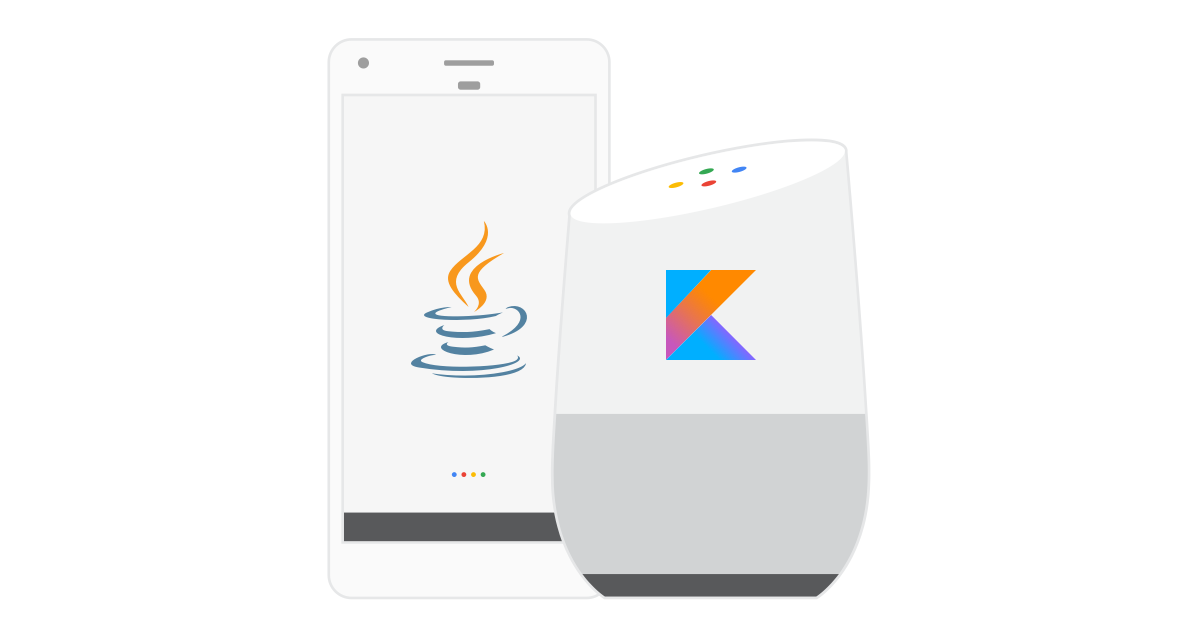This is a port of the official Node.js SDK to Kotlin. This can also be used from Java and any JVM language.
Quick Facts
- Port of the actions-on-google SDK to Kotlin. Kotlin and Java developers can quickly start building Actions for Google Assistant.
- Closely matches Node.js Client Library API
- Closely matches implementation of Node.js sdk so code can be maintained easily as features are added
- All tests ported from nodejs SDK (using Spek framework) & 100% passing
- Dialogflow and Actions SDK support
- Conversation Components & Transaction Sample ported
- Supports v2 of Actions on Google API (if v1 is needed, make an issue please)
This library is available on jCenter and Maven Central. If your using gradle simply add the dependency as follows:
Gradle:
repositories {
jCenter()
}
}
dependencies {
compile 'com.tmsdurham.actions:actions-on-google:1.2.15'
}
Maven:
<dependency>
<groupId>com.tmsdurham.actions</groupId>
<artifactId>actions-on-google</artifactId>
<version>1.2.7</version>
<type>pom</type>
</dependency>
The above artifact should fit the needs of most developers, however, if you are not using java.servlet.http.HttpServlet, or do not want to use Gson for deserialization, you can use the actions-on-google-core lib. For example how to use the core library, reading through the sdk-gson-servlet module.
Gradle:
compile 'com.tmsdurham.actions:actions-on-google-core:1.2.15'. //only if not using Servlets
Maven:
<dependency>
<groupId>com.tmsdurham.actions</groupId>
<artifactId>actions-on-google-core</artifactId> //only if not using Servlets
<version>1.2.15</version>
<type>pom</type>
</dependency>
fun welcome(app: DialogflowApp) =
app.ask(app.buildRichResponse()
.addSimpleResponse(speech = "Hi there!", displayText = "Hello there!")
.addSimpleResponse(
speech = """I can show you basic cards, lists and carousels as well as
"suggestions on your phone""",
displayText = """"I can show you basic cards, lists and carousels as
"well as suggestions"""")
.addSuggestions("Basic Card", "List", "Carousel", "Suggestions"))
fun normalAsk(app: DialogflowApp) = app.ask("Ask me to show you a list, carousel, or basic card")
fun suggestions(app: DialogflowApp) {
app.ask(app
.buildRichResponse()
.addSimpleResponse("This is a simple response for suggestions")
.addSuggestions("Suggestion Chips")
.addSuggestions("Basic Card", "List", "Carousel")
.addSuggestionLink("Suggestion Link", "https://assistant.google.com/"))
}
val actionMap = mapOf(
WELCOME to ::welcome,
NORMAL_ASK to ::normalAsk,
SUGGESTIONS to ::suggestions)
@WebServlet("/conversation")
class WebHook : HttpServlet() {
override fun doPost(req: HttpServletRequest, resp: HttpServletResponse) {
DialogflowAction(req, resp).handleRequest(actionMap)
}
}
@WebServlet("/conversation/java")
public class ConversationComponentsSampleJava extends HttpServlet {
private static final Logger logger = Logger.getAnonymousLogger();
Function1<DialogflowApp, Object> welcome = app -> {
app.ask(app.buildRichResponse()
.addSimpleResponse("Hi there from Java!", "Hello there from Java!")
.addSimpleResponse(
"I can show you basic cards, lists and carousels as well as suggestions on your phone",
"I can show you basic cards, lists and carousels as well as suggestions")
.addSuggestions("Basic Card", "List", "Carousel", "Suggestions"), null);
return Unit.INSTANCE;
};
Function1<DialogflowApp, Object> normalAsk = app ->
app.ask("Ask me to show you a list, carousel, or basic card");
Function1<DialogflowApp, Object> suggestions = app ->
app.ask(app.buildRichResponse(null)
.addSimpleResponse("This is a simple response for suggestions", null)
.addSuggestions("Suggestion Chips")
.addSuggestions("Basic Card", "List", "Carousel")
.addSuggestionLink("Suggestion Link", "https://assistant.google.com/"));
private Map<String, Function1<String, Object>> intentMap = new HashMap() {{
put(ConversationComponentsSampleKt.WELCOME, welcome);
put(ConversationComponentsSampleKt.NORMAL_ASK, normalAsk);
put(ConversationComponentsSampleKt.SUGGESTIONS, suggestions);
}};
@Override
protected void doPost(HttpServletRequest req, HttpServletResponse resp) throws ServletException, IOException {
DialogflowAction action = new DialogflowAction(req, resp);
action.handleRequest(intentMap);
}
}
Dialogflow can be integrated with other platforms, such as Facebook Messenger, Slack, etc. Actions-on-Goolge-kotlin can be extended and data for those platforms returned from your webhook. To do this, simply add to the data for your platform using the app.data function. This must be done before calling the ask function.
val app = DialogflowAction(resp, req, gson)
val facebookResponse = //build response with your choice of method
app.data {
this["facebook"] = facebookMessages
}
app.ask("Hello facebook users!")
The objects in the data object will be passed to the original platform. It may also be used to send custom data back in the response to the /query rest endpoint. More info on this is in the Dialogflow docs.
See LICENSE.md.
